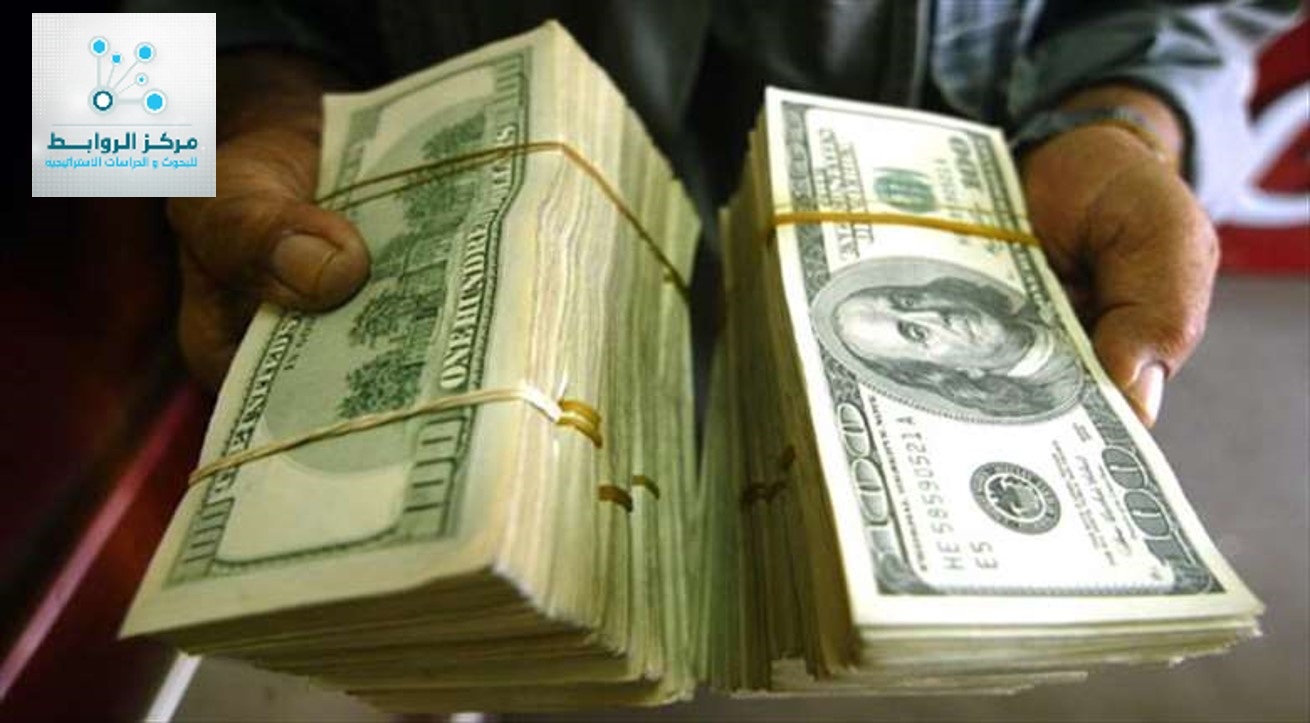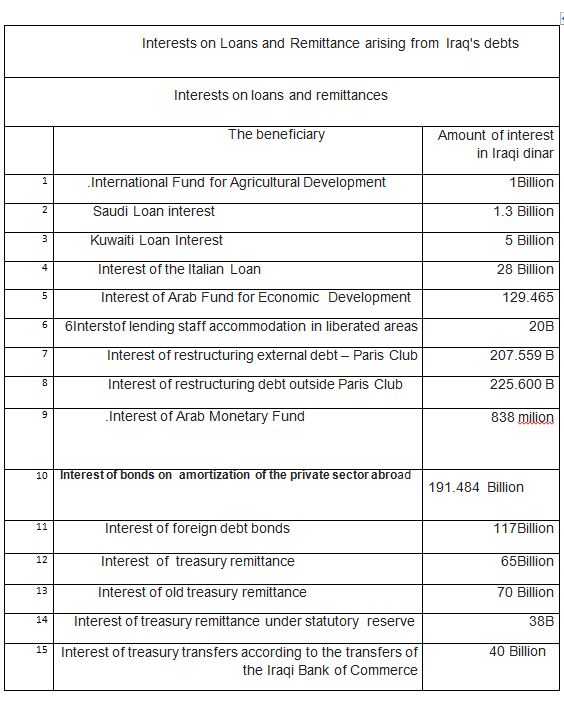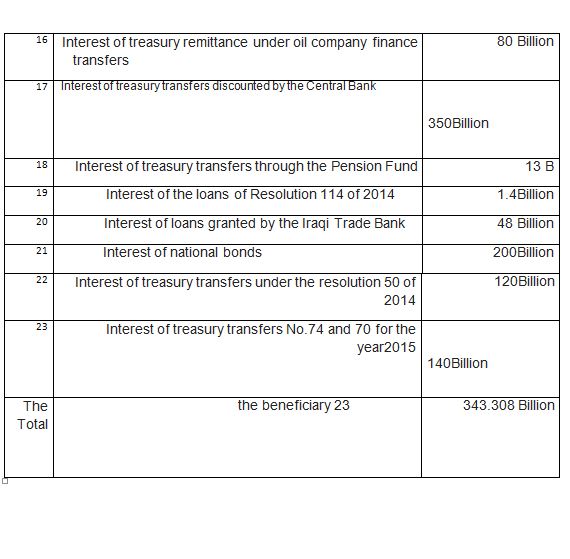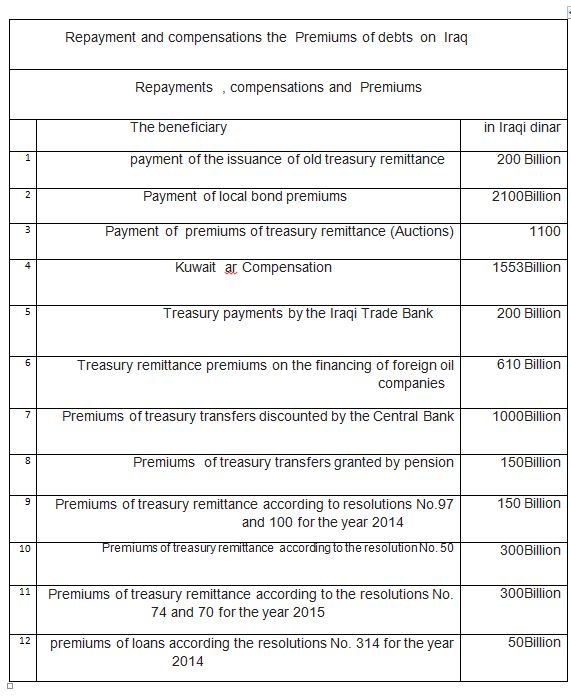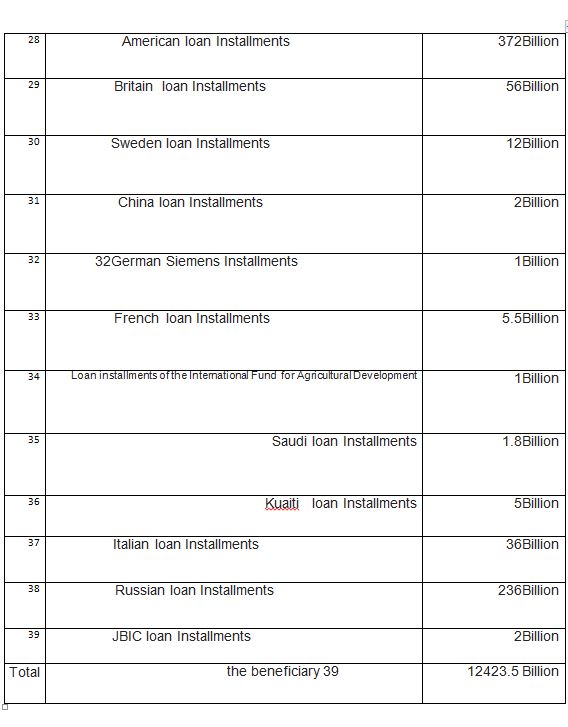Shatha Khalil *
Iraq is entering the circle of danger because of the doubling of debts and the rise of them , where the expert and economist , Iraqi professor Dr. Abdul Rahman Najm Mashhadani confirmed the warning of the Deputy President of the International Monetary Fund to the Iraqi government in the “Kuwait Conference for the reconstruction of Iraq” that the policy of borrowing has become dangerous to Iraq and the interests that Iraq must pay it in the year 2022 about (60%) of its revenues, i.e. it will be unable to repay its debts and the payment of the interests on them also, Iraq is moving towards a real disaster that the government does not care about it .
Mashhadani stressed that Iraq during 2014 and 2016 wasted $ 202 billion, which came from $ 36 billion in foreign loans; $ 23 billion from the decrease of reserve in central bank, $ 33 billion comes from the rise of in domestic debt, and (120) Billion dollars of oil revenues.
Mashhadani added that Iraq needs 30 years to repay its internal and external debts, which will put Iraq’s oil resources for many years under the mortgage of banks and creditor countries.
In the same context, specialists stressed what was reported in a recent and important news , confirmed that there are more than (4) million government employees and (3.7) million retirees, plus 2 million Iraqis registered under the so-called social welfare network that they receive monthly salaries to lift them out of poverty.
The Ministry of Planning, according to figures and statistics, sounded the alarm that began to threaten the body of the Iraqi state and the future of development, in a country that its government was forced to borrow for the third year in a row to secure (42) Billion ” dollars annually to cover its operating budget, and experts described the private sector as the savior, in the event that the State has started to support it and urge it to work again in the local market.
Mashhadani criticized the budget of 2019 because it is illogical, and there is an exaggeration of operational figures, surprising the context of the distribution of proportions to the provinces and ministries, and pointed out that he was expected to press the expenses, not to maximize, adding that the budget needs to be significantly modified because the large increase is suicidal, because of the large deficit and borrowing, stressing that in (2022) Iraq will not be able to repay its external debt only by paying (60%) of its imports !!
Economists and experts said that the proposed draft bill (2019) , shows any follower that Iraq is steeped in its debts and the interests of previous debts, which may amount to the extent that Iraq would lose more than (15%) of its budget to pay these debts, if oil prices did not increase , It would be possible that these debts and their payments would amount to 70 percent of Iraq’s annual budget.
A member of the Iraqi Finance Committee in the Iraqi parliament Rahim Darraji, said that since 2003 and to date, Iraq resulted in many debts due to the wrong policies of successive governments, and that the governments that took power has no wisdom in managing the financial and monetary policy of the country, and the budgets of Iraq’s previous budgets were exaggerated and lack of good management and not based on study and planning, but on the basis of so-called fill-in spaces, that future generations will bear the current debt burden.
A member of the economic committee in the Iraqi parliament, Nora al-Bajari, said that the debts that have burdened the Iraqi economy caused by rampant corruption in the country, and the fight against the terrorist organization ISIS, in addition to the seizure of officials and parties affiliated to take over projects in the deals of corruption.
The total amount of these benefits and repayments to Iraq about 12423.5 billion Iraqi dinars, equivalent to about 12770 billion dollars.
When borrowing is positive?
State borrowing can be useful and positive in many situations, most notably:
• States should have plans and objectives for borrowing, with their causes, dimensions and sources, and not for patchwork.
• The borrowing should not be based on sovereign guarantees in a way that guarantees the unity of the country and non-interference in its affairs.
• The borrowing should be for urgent necessities such as wars or investment to maximize returns.
• The State should have the proven capacity to serve the debts and repay the debts within their deadlines without renewal.
• The lending state should be easy and can give some permissiveness such as reprogramming loans.
• Not to borrow with greedy countries or to have hostile objectives or to save grudges with borrowers.
• Prior intentions must be made to restore the loan schedule or to extinguish it or settle it amicably without acquiescence.
• Borrowing is a unanimous collective decision and not based on an individual opinion and involves corruption.
• There is a real will to pay loans on time and not to beg to postpone them year after year.
Iraqi Finance Committee:
The Parliamentary Finance Committee has not classified foreign loans that its value is more than $ 70 billion, some of which are bad debts that were considered debt despite being subsidized during the first Gulf War. Some of them can also can be settled at the Paris Club for Debt. Other debts can be negotiated to extinguish them or convert them into investments or any formula agreed upon, as part of their political and military goalsand as done with a political system that has ended and can not pay any dollar. According to data provided by Iraq in 2012, Iraq ranked (60) between countries in terms of indebtedness, which is a good rank if there have been serious policies to address the debt, but the reality is not telling good news l, as external loans and internal indebtedness multiply year after year, noting that in the draft federal budget for the year 2018, it was planned to address the budget deficit of (12) trillion dinars, by authorizing the Ministry of Finance to find External sources of borrowing, as well as the inclusion of expenditure paragraphs to be financed through loans previously agreed, leaving the door open to borrow from the Central Bank by treasury bills, bonds, credit and other available means.
This means that loans are generated annually in the hope of rising oil prices, a possibility that is difficult to achieve , if not impossible, because alternatives to oil are possible and can prevent any crises to supply black gold (oil), after there are more possibilities for export, and to limit the crisis of hgh prices , a the most serious issue is that the IMF has long hands in Iraq and can influence the government to make decisions that do not take into account the interests of the poor, which are increasing annually. The measures for economic reform and increasing national income need an administration and will that are not currently available, There is a real need for (200) billion dollars, in order to put things back to normal, which requires attention before it is too late.
Note: The tables are for Rawabet center
Translated by : mudhaffar al-kusairi
Economic Studies Unit
Rawabet Center for Research and Strategic Studies

